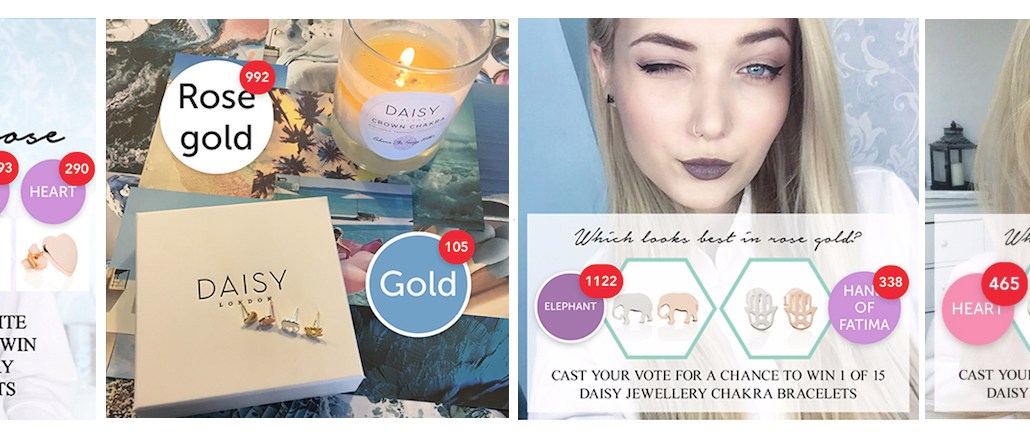Save 50% on a 3-month Digiday+ membership. Ends Dec 5.
Jewelry brand Daisy London is letting teens vote on what to make next

Trends these days spread at lightning speed, greased along by social media. This can cause confusion for many retailers trying to anticipate what their customers want next. For Daisy London, a U.K. jewelry brand, it gets downright frustrating.
“It’s so hard to know what customers want now. Everything happens so incredibly quickly,” said marketing manager Kiran Mistry.
The brand is now looking to teen app Yubl to help it get input during the design process, not feedback afterwards.
Yubl is a messaging app known for its “this or that” voting function. For instance, Yubl users can ask friends which party dress they should wear or give a group several restaurant options for dinner.

Daisy London’s three-person marketing team has been using the platform since its launch, posting pictures that prompt users to vote for their favorite products or inspirational quotes.
Engagement per post has been higher — and more visible — than channels like on Instagram, where it has over 21,000 followers. So, now the brand is giving its Yubl audience a vote on its design process.
Ad position: web_incontent_pos1
According to Mistry, Instagram, while popular, doesn’t net the brand much meaningful engagement. Likes are too generic to mean anything, while comments are few. Yubl, she said, allows more nuanced insights beyond the usual double-tap. “It’s easy to give an opinion without having to write something,” she said.
The company started with the mismatched collection of single earrings it’s releasing with YouTube star Roxxsaurus. Last month, the team let its Yubl audience narrow down 13 earring styles to a final set of five. Later, they chose the colors (gold, silver, rose gold) each earring should be and how the set should be packaged.

In total, Daisy London saw 7,500 interactions in the voting process, while its following on the platform grew 692 percent. It’s too early for sales figures, but Mistry is optimistic that the set will do well. The voting is also shaping future decisions about selling more mismatched earrings, as opposed to identical pairs.
By using existing designs, the brand has also minimized risk here. It has essentially repackaging products it already has, by mixing up different sets from its online collections. Mistry says this is to save the brand time during peak trading; however, it does mean that it has less skin in the game if the set doesn’t sell, as it can simply pair its earrings back up and sell them as normal.
Ad position: web_incontent_pos2
In the future, however, this method could inform entirely new products, she said. “We knew with the timescale we wouldn’t be able to design something from scratch,” she added.
The brand sells around 80,000 products annually, and has seen a 30 percent revenue growth since last year.
App Annie estimates Yubl has had between 100,000 and 500,000 downloads since launching in February. (Yubl puts this figure at 800,000.) It’s frequently in the top-10 social apps downloaded on iOS and in the top 20 on Google Play.
More in Marketing

Ulta, Best Buy and Adidas dominate AI holiday shopping mentions
The brands that are seeing the biggest boost from this shift in consumer behavior are some of the biggest retailers.

U.K. retailer Boots leads brand efforts to invest in ad creative’s data layer
For media dollars to make an impact, brands need ad creative that actually hits. More CMOs are investing in pre- and post-flight measurement.
Ad position: web_bfu